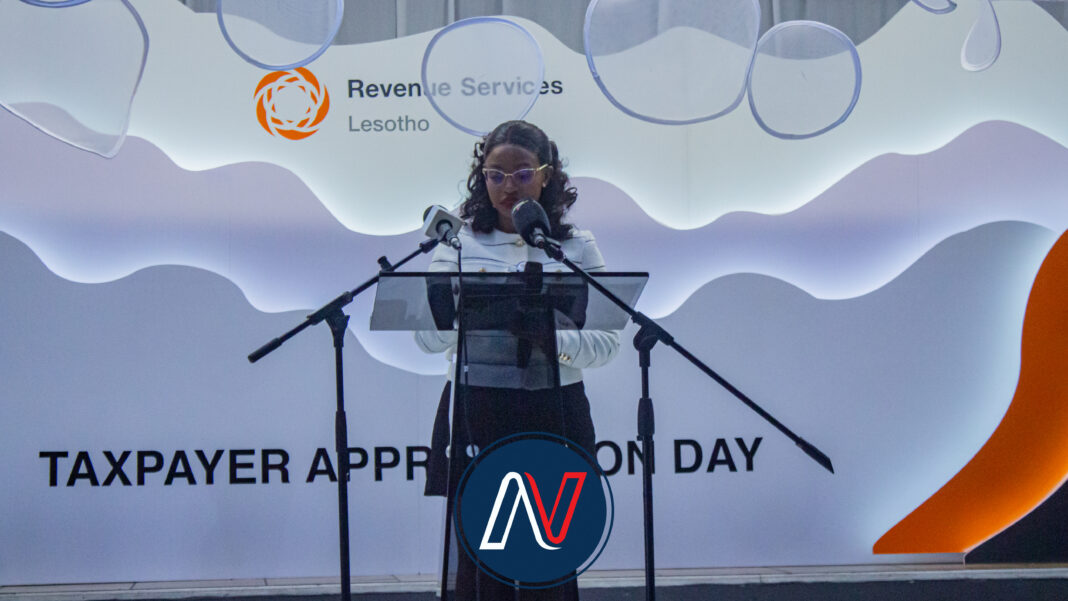As Lesotho continues to navigate a complex economic landscape, the Revenue Services Lesotho (RSL) has issued a strong warning: the country must reduce its long-standing dependence on foreign aid, loans, and donations and focus on building its own financial resilience.
These sentiments were expressed by the Commissioner General of RSL, ‘Mathabo Mokoko, at the recent Taxpayer Appreciation Day in Maseru.
Mokoko noted that while external assistance has supported Lesotho’s development over the years, the future depends on the Kingdom’s ability to mobilise and manage its own resources.
“Domestic resource mobilisation is no longer optional it is a necessity,” she stressed.
“The true future of Lesotho’s development rests in our ability to generate and mobilise our own resources to drive progress.”
Although foreign aid often provides temporary relief, it typically comes with strict conditions that expose the country to external pressures and undermine fiscal independence. Mokoko’s remarks signalled a clear shift in emphasis toward sustainable, home-grown development strategies, supported by efficient tax systems and responsible governance.
At the heart of this approach is the role of tax revenue, which Mokoko described as a “vital barometer” of Lesotho’s capacity to sustain economic growth, attract investment, and improve public services.
“Paying taxes is more than a legal obligation. It is an act of loyalty to our nation,” she said.
Highlighting the 2024/2025 fiscal year performance, Mokoko revealed that the RSL collected M9.74 billion, surpassing the revenue target by M261.2 million. Lesotho’s tax-to-GDP ratio increased from 22.5% to 23.5%, while annual remittances grew by 4.8%.
She said these results reflect growing trust between taxpayers and the administration, alongside improved fiscal discipline.
“Taxes are not simply figures on a form. They are classrooms filled with eager learners, hospitals that save lives, roads that connect our communities, pensions that provide dignity to our elders, and programmes that empower the vulnerable and the youth.” Mokoko emphasised.
However, she cautioned that as government responsibilities expand, so does the need for consistent tax compliance. Mokoko urged citizens to honour their obligations, warning that tax evasion places an unfair burden on compliant taxpayers.
“Compliance is not only about the law; it is about fairness and shared responsibility. Let us build a culture where compliance is the rule, not the exception,” she urged.
To strengthen compliance and boost efficiency, the RSL has identified several strategic priorities. These include expanding digital platforms to reduce bureaucracy, using data analytics to improve risk management and decision-making, enhancing taxpayer education to encourage voluntary compliance, deepening public-private partnerships to build trust, and improving taxpayer services to ensure citizens feel respected and valued.
Progress on the digital front is already evident. The RSL’s e-Tax platform now enables online registration, electronic payments, and near-instant issuance of Tax Clearance Certificates. Upcoming innovations include electronic invoicing and automated PAYE compliance systems.
In addition, the RSL has incorporated artificial intelligence into its customer service operations, improving feedback channels and allowing for more personalised taxpayer engagement.
“These innovations are bringing us closer to a modern, trusted tax administration,” Mokoko said, adding that continued investment in digital tools is crucial for sustaining efficiency and transparency in public finance management.
Lesotho now stands at a critical juncture. Reducing reliance on foreign aid is not just a matter of national pride, it is essential for positioning the country as a resilient, self-sustaining economy in an increasingly competitive global environment.
As Mokoko concluded, “Government cannot provide without the resources that only you, the taxpayers, make possible.”
Summary
- At the heart of this approach is the role of tax revenue, which Mokoko described as a “vital barometer” of Lesotho’s capacity to sustain economic growth, attract investment, and improve public services.
- “These innovations are bringing us closer to a modern, trusted tax administration,” Mokoko said, adding that continued investment in digital tools is crucial for sustaining efficiency and transparency in public finance management.
- Reducing reliance on foreign aid is not just a matter of national pride, it is essential for positioning the country as a resilient, self-sustaining economy in an increasingly competitive global environment.

Seabata Mahao is a general news reporter with special focus on Business and Sports. Started working at Newsday in 2021. Working in a team with a shared goal is what I enjoy most and that gives me the motivation to work under any environment leading to growth.









